Questions & Answers with community faces
Andrew Paul Dost (40) grew up downstate in Cass City. When he was three years old, the Dost family moved to Benzie County in 1986, and his parents, Mark (67) and Cheryl (67), became beloved teachers at Frankfort-Elberta Area Schools for more than 30 years. (Editor’s Note/Full Disclosure: They may both be on the list of favorite teachers of The Betsie Current’s co-owner and designer, Jordan Bates.)
In 2001, Dost graduated as valedictorian from Frankfort High School; he then graduated from Central Michigan University with a Bachelor of Arts degree in journalism in 2005. However, music had always been a big part of Dost’s life; he began playing piano at eight years old and progressed from there to trumpet in the 5th grade, then guitar when he turned 13.
While at CMU, Dost began his professional music career as a member of Anathallo, a band that had formed in 2000 and which Dost joined in 2002. Anathallo released the “Floating World” album in 2006 and continued to tour, write, and record, until Dost and the band parted ways around 2007.
In 2005, Dost had written a quirky musical about the life of Christopher Columbus, and after leaving Anathallo, he began working on a solo album called “Columbus” that was based on his musical, and the album was released in 2009.
Meanwhile, in 2008, Nate Ruess (former frontman of The Format) asked Dost to start a new band—stylized as “fun.” but which will not be written that way henceforth, just for clarity of grammar—with Jack Antonoff (of Steel Train before Fun and Bleachers after). The three men knew each other because their former bands had toured together previously. Their first album, “Aim and Ignite,” was released in 2009 to moderate commercial success.
In 2012, however, things changed majorly. Fun’s second album, “Some Nights,” peaked at #3 on the U.S. Billboard 200 chart and featured the band’s first #1 hit single, “We Are Young,” which topped charts for six straight weeks, as well as “Some Nights” and “Carry On,” popular songs which reached the Top 20. In 2013, Fun won two Grammy awards: Best New Artist and Song of the Year for “We Are Young.”
During the Fun years, Dost had all kinds of amazing opportunities, such as performing on Saturday Night Live and on The Tonight Show with Jimmy Fallon; with bands like Queen and the Beach Boys; at Coachella and at the White House on July 4, because the daughters of President Barack Obama (D) were reportedly big fans—and of course, Dost’s parents were able to join him there.
Despite all of their successes, Fun announced in 2015 that they were “not splitting up” but were taking time off to pursue other projects individually. For Dost—a multi-instrumentalist, vocalist, songwriter, and composer—that has meant composing the soundtrack for the 2015 dark comedy film The D Train and many other documentaries, television series, podcasts, and video games.
During the COVID-19 pandemic, Dost left Los Angeles—where he had been living on and off, after a stint in New York—and returned to Northern Michigan, following in the footsteps of his teacher parents: in 2021, Dost became an instructor of singer-songwriting at Interlochen Arts Academy.
Most recently, he formed a new band, Metal Bubble Trio, which is not a trio at all; the cheekily-named group rotates, based on whoever is around and can play—they have had as many as 12 members onstage, and as few as four, but have yet to perform as an actual trio.
Continuing with our interview series on impactful Benzie County characters, The Betsie Current caught up with Dost as he was finishing up the 2023 school year and preparing for summer shows.
The Betsie Current: What made you want to pursue music as a career? What do you enjoy about this line of work?
Andrew Dost: I haven’t really ever thought about doing anything else. When I was around 10 years old, my parents got a Beatles cassette tape—the red 1962-66 compilation—and I couldn’t stop listening to it and thinking about it, which turned into writing songs, playing guitar, and so on. A career in music never really felt like a decision I made at any point, more like something that took on its own sort of gravitational pull in my life. I enjoy a lot of components of it, even when it’s frustrating. I like connecting with people; moments of shared inspiration. I like being able to travel. I like coming home. I like when one of my friends writes something that inspires me. The whole process still seems to live of its own accord, and evolve constantly; the processes of songwriting and recording are never the same twice.
Current: Beyond your own fame, you have performed with some world-famous artists. Can you share some of your top performance experiences?
Dost: I’ve had a really nice and surreal run of connecting with people I admire. We played as Queen with the surviving members. I got to sing with the Beach Boys. I have been pretty lucky to play with artists that I admire, and also friends doing cool things. I just love to collaborate and share music with people. That’s what it’s all about for me. Making new friends, making music with old friends.
Current: What made you want to teach music? How does the life of a music teacher differ and/or go hand-in-hand with the life of a music creator/performer?
Dost: I’ve always admired teachers. My parents were both teachers, and I was fortunate to have a lot of teachers growing up who had a huge impact on me. It feels a bit like things coming full circle; ideally, I can pay some of that impact and inspiration forward. The process seems to really go along with being an artist—teaching requires a lot of creativity and thoughtfulness. It’s planning, but also improvisation; adapting from day to day, depending on what the students need and what is or isn’t connecting.
Current: What does a typical day of work look like for you?
Dost: It really varies, which is part of what I’m enjoying a lot at this exact moment in life. Maybe it’s getting up, putting on a button-up shirt, helping students work on their songs, preparing for a concert, or teaching in some other capacity. Maybe it’s staying home in sweatpants, hunching over my computer, trying to get the timing of a piece of music exactly right for a commercial or film project. If there’s a show coming up for my new band, Metal Bubble Trio, then we’ll rehearse and fine-tune some details of how we want the show to unfold. In general, I feel very fortunate to get to chase a kind of curiosity that always has driven me: “What would it sound like if I record the construction across the street? Could I get that front-end-loader noise to sound like a bass drum? Would it ruin the entire song if I reverse every drum hit? Let’s try it.” If there’s a show that day, I just try to be well-rested and well-hydrated, because I know I’ll be on my feet a lot, and talking to people, having to make some eye contact, which requires a lot of energy for me!
Current: How have you witnessed the music world itself change since you started playing? How did that further change when the COVID-19 pandemic hit Northern Michigan in March 2020? How have things “gone back to normal,” and what kinds of things do you expect will be a “new normal” in the music industry?
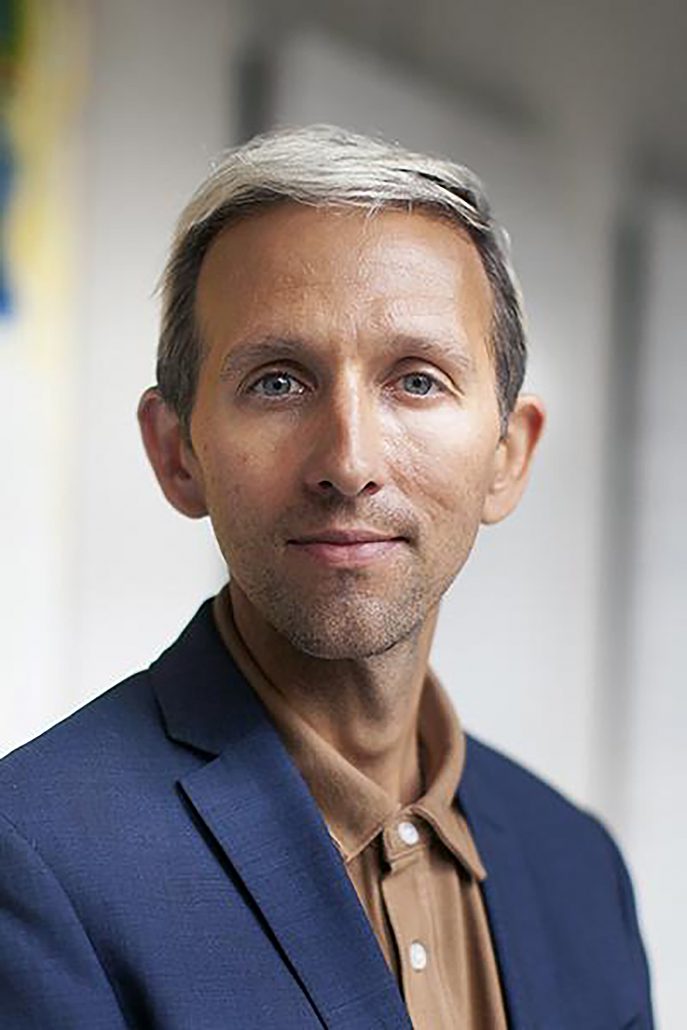
Dost: Since I started making a career of music, nearly every component of it has changed. Nobody—or very few people, anyway—buys music anymore. Myself included; I have to be completely obsessed with an artist to buy the vinyl pressing of their release. No more CDs. So that has impacted my experience as a listener, but also as a creator. How do you pay the bills if nobody buys your music? You tour, and hopefully build enough of a following that people can support you through live performance. But then, of course, in the face of COVID-19, that shifted, as well. No more shows. So some people pivoted to a livestreaming situation, but that wasn’t ever something that interested me, either as a fan or performer. I’m not sure why. Fortunately for me, though, this time re-awakened some kind of dormant creativity in me, and I started writing songs again, which I hadn’t really done in a way that satisfied me since the last Fun album. So I sunk more deeply into writing and recording, and fortunately now that people are going to shows, I have an album ready for release and a lot of talented people to help me bring it to life in a live setting. As far as a “new normal,” I think people will always want to see things performed live, whether it’s comedy, music, sports, whatever. It connects us in so many powerful ways. How things changed for me personally in the post-pandemic world: I was living in Los Angeles before the pandemic. But Michigan is just home. When I think about living other places, I’ve lived in New York, in L.A., where I was when the pandemic hit. When I’m not in Michigan, I think about it—my family, my friends, the land, the water. I feel the pull. I loved living in L.A., but for some reason, there is a gravitational force that makes me want to be here. Anyone who lives in Northern Michigan understands that it has this magic that makes it impossible to describe. Sometimes, it’s just a bite of squash that came out of your neighbor’s garden. It always just feels like home in a very deep and resonant way.
Current: What do you think is different about the music that you are creating from what is already out there?
Dost: I don’t really know how to answer this. I think every artist likes to think their work is different and original, but all I can really say is that I don’t really release music unless it has some resonance for me as a person. I think everybody is like that; it just maybe takes me longer to tap into those places or to realize what I’m actually even feeling.
Current: What role do you think music, musicians, and songwriting play in the world? Why is this so important to you?
Dost: This is something I’ve always sort of struggled with. Is music important? What gives me the right to think I’m worth listening to? It’s not like I’m providing fresh water for people, performing life-saving surgery, that sort of thing. But then I look at my own life and how music—and art, as a whole—has impacted it. Not just in terms of the career I’ve built, but how full my life has been because of others’ art. It has taught me how to feel. How to be more compassionate. How to understand my own heart a little bit better. To be kinder and more empathetic. That’s the kind of artist I strive to be, and I think the more tender, open, and kind we can be, the better the world is. Art can help us to do that.
Current: How have you seen your work grow and change? How do you hope that it will continue to grow? What is next?
Dost: If I look back on songs I was writing even five years ago, visual art I was making, ideas I was having, etc., they’re completely different from the space I’m in now. I don’t know if it’s growth necessarily, as there’s some sort of handmade, sloppy charm to everything that anybody does at every level, for the most part. Even when I’d classify some of my work as ‘embarrassingly bad,’ it still represents some kind of path through those phases that every artist needs to walk. I’m really proud of the album I just finished; it ended up being a sort of modern Bossa Nova/tropicalia/indie rock fusion. I like the overall sound, I like the songs, and most importantly, I liked the process. That’s important to me—to enjoy the pursuit of something I like, even if the finished product confuses me a little. In fact, that’s something I pursue: confusion, surprise, and excitement, when those things lead to something unexpected. So, up next for me is releasing this album, called “Cucumber,” playing it live, and then returning to the studio to write and record the next album, which so far, I’m envisioning as more jazz-minded meeting with some fits of metal. I have to make the name of the band make some sense! I’m also still composing for films and commercials.
Current: What can you tell us about your work with film and soundtracks, or other projects of note?
Dost: Last winter, I finished the score for By My Side, a film about therapy dogs for veterans. It highlights a program that pairs vets suffering from PTSD with dogs that help them. It’s about the healing power of therapy dog companions, and how transformative they are for the whole family. The family dynamics shift when a dog enters the picture; veterans open up and reconnect with their friends and families. One of my students at Interlochen has a therapy dog. I’m a dog owner, too. My relationship with my dog has been transformative, healing for me. We’ve had each other for about eight years. She’s more than just a companion to go on hikes with. The longer we spend time together, the deeper and richer the connection between us becomes.
Current: What kinds of things do you do for fun, when you are not working? What other things are you involved with? How did you get involved with them, and why are you passionate about these causes?
Dost: I love to kayak, I love hiking with my dog, I love spending time with my family. I love to play basketball, and watch it—as I’m typing this, it’s the conference finals in the NBA, and it’s been a very fun playoffs so far. I love to make food, to make recipes. I love to eat. I love to experiment with stuff, combine flavors that appeal to me. I didn’t realize how much I loved to cook until about a year ago. I’m thinking constantly about the next meal. We’re also so lucky in Michigan; the ground here wants us to survive. We have ramps in the springtime; ferns and mushrooms. I love foraging. The Earth seems to want to nurture us here. As far as causes, I helped to found a nonprofit in 2013 that provides support for LGBTQ+ youth called The Ally Coalition that I’m really proud of. Essentially, we partner with organizations in need of funding to help them build out their programs and resources. I also try to support animal rescues however I can, particularly Rebel Dogs Detroit and A Rejoyceful Animal Rescue.
Current: How have you seen Benzie County/Northern Michigan change since you grew up here? What are your hopes for the area in the future?
Dost: It has, of course, changed in so many ways. It felt so sleepy and remote when I was growing up, and now it feels like it’s a part of a larger conversation in the country. I don’t know if it’s because of the internet, or what, but it feels more connected or modern or something. But fortunately, this place still has a character—in terms of the land and the people—that feels like home, no matter what. Once I pass through the gateway into Frankfort, it still feels like coming home. Stormcloud wasn’t there when I was growing up, for example, but it still feels like a natural extension of the area.
Current: What are the biggest challenges and rewards of living/working in Northern Michigan? What is the best or most rewarding part of your job?
Dost: It sometimes feels tricky to remain connected to certain parts of my life—the film industry, in particular. It’s so much easier to live in Los Angeles, meet somebody who’s working on something, and get looped into it. But increasingly, people are making incredible work right here, and it’s fun to see that part of the area blossom. It’s really fun to connect and collaborate with people I’ve known for years, or people who have just come to the area because of how special it is.
Current: What could Northern Michigan/Benzie County do to attract more talented people to this area? What else does Northern Michigan/Benzie County need?
Dost: I think rather than attracting more people to the area, I’ve just been delighted seeing the creativity that’s always been here get more recognition. The art and ceramics program at Frankfort High School is outstanding; I’ve been so impressed by what [art teacher] Kristine Harvey has built there. Levi Britton is back in the area and is an incredible songwriter and performer. Andrew Lutes and Jack Senff write some of the most heartfelt songs I’ve ever heard. Same for Joshua Davis, Blake Elliott, and Courtney Kaiser-Sandler, who I’ve been fortunate to teach with at Interlochen over the past two years. People are making films, albums, stunning visual art—Amanda Acker and Dana Falconberry [of Roll Model, which The Betsie Current profiled a few years back] to name a couple—I could go on and on.
Current: What are your favorite local events and activities? Any favorite dining, recreation, hiking spots?
Dost: I still go to A&W every time I go to Frankfort and get a coney dog.
Current: What does your perfect summer day look like in Benzie County? How would you spend it?
Dost: I’d start with a nutty crescent or cherry fritter from Crescent Bakery. Then I’d eat a coney dog and hike Baldy. Then I’d get a Judy sub from East Short Market, see Jazz Night at The Garden Theater—which we’re playing June 29—and watch the sun set at Frankfort beach. I realize a lot of this includes the food, but that’s just generally how I think!
Follow @AndrewDost on Instagram and check out @MetalBubbleTrio on Instagram to learn more about Dost’s new band, Metal Bubble Trio. Catch them at Jazz Night at The Garden Theater on Thursday, June 29; tickets available at GardenTheater.org/live-at-the-garden-2 online. Also catch them at Leelanau Uncaged in September.
Learn more about The Ally Coalition—which provides support for grassroots nonprofit organizations dedicated to bettering the lives of LGBTQ+ youth—at TheAllyCoalition.org online, @AllyCoalition on Instagram, and “The Ally Coalition” on Facebook.
A portion of this article came from a previous Q&A in the Glen Arbor Sun, a Leelanau County-based semi-sister publication to The Betsie Current.
Featured Photo Caption: Andrew Dost (right) and Jarad “Sasquatch” Selner. Photo courtesy Gail Klingelsmith.

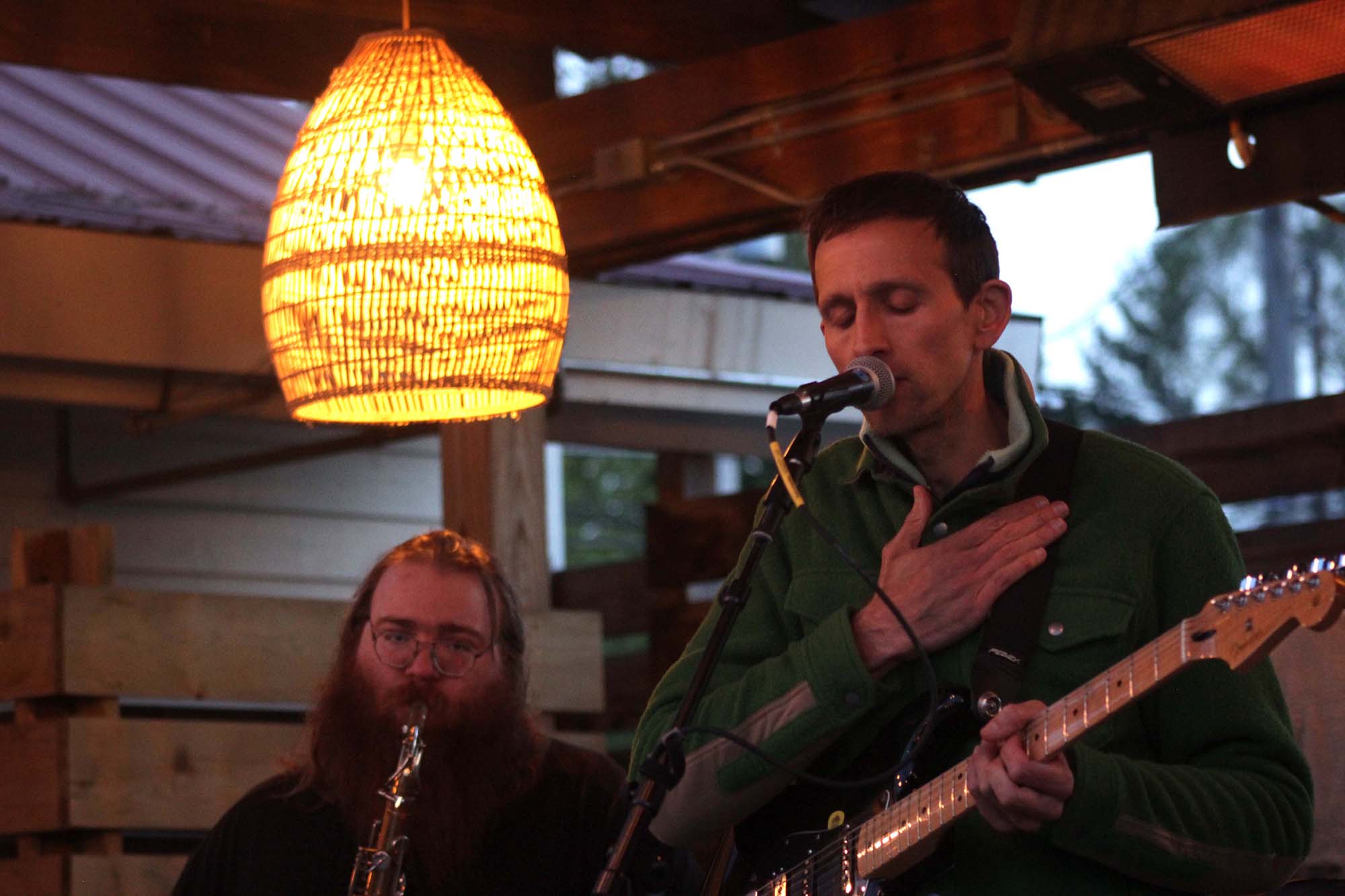
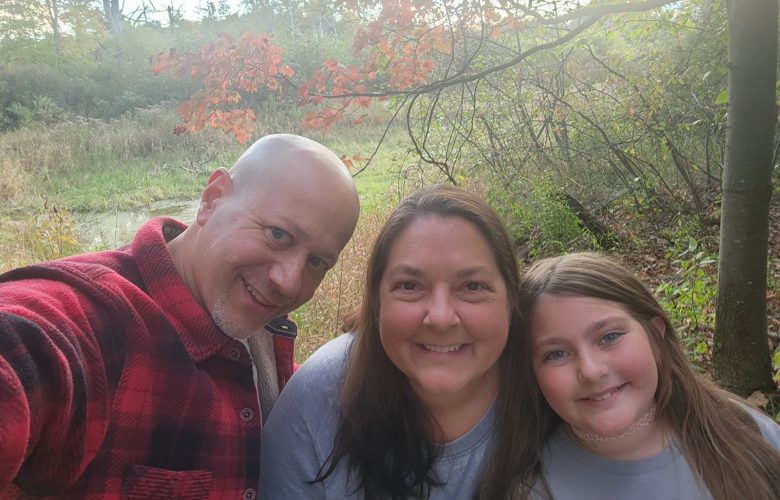
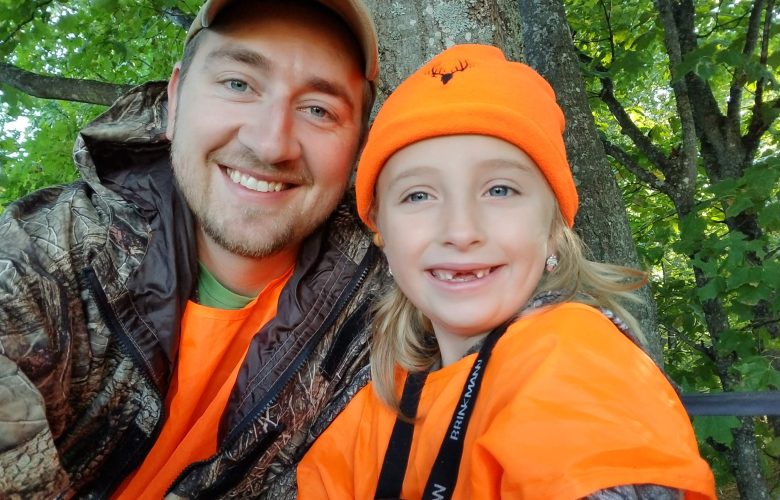
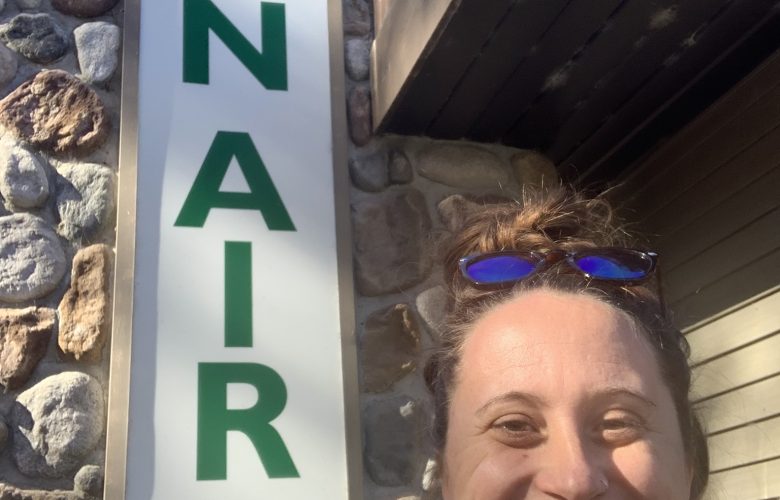
When my son Eli was in 3rd grade, Mrs. Dost was his teacher and she knew exactly how to teach him with his anxiety. Eli admired Andrew when he would stop in to see his mother. Andrew got Eli to play the guitar and sign in front of the class. I treasure this moment and appreciate the mentoring in 3rd grade. God Speed.